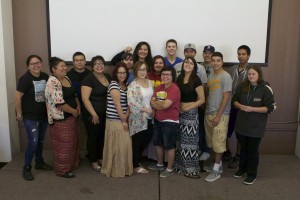Canadian Mennonite University (CMU) is pleased to host and facilitate the first Peguis First Nation Post-secondary Indigenous Transition Program.
Designed by the Manitoba First Nations Education Resource Centre (MFNERC), the 10-month program aims to assist students in the transition from high school to postsecondary education, from the reserve to an urban setting.
With the support of the Peguis First Nation School Board, 19 students from Peguis First Nation are participating in the transition program, which began in August 2015. It is the first transition program in Manitoba to occur in Winnipeg, allowing students to fully experience city life. Eighteen of the students are living on CMU’s campus.

“It’s an honour for CMU to work in partnership with Peguis First Nation to make this program possible,” says CMU President Cheryl Pauls. “There is significant evidence that quality of academic and life learning can be correlated directly to quality of relationships students have with instructors and peers. The cohort model of this Transition Program builds on and strengthens the relational commitments of the CMU learning community.”
The transition program includes a combination of life skills training, an Indigenous cultural awareness component, as well as university courses accredited through CMU.
“Everything they learn in this program is going to be the skills they use in the future,” says Clairissa Kelly, Program Coordinator and Student Counsellor. “It’s about setting them up for success in the future.
Drawing on the medicine wheel, the transition program offers supports in four key areas, explains Kelly: physical—focusing on housing, transportation, and physical health; social —focusing on relationship building, peer-to-peer learning, recreation, and volunteering; mental—including setting education and employment goals and meeting mental health needs; and spiritual—including cultural components and learning such as smudging and participating in a traditional sweat.
“I see this program as a way of reconciliation—an example of how reconciliation can be achieved between First Nations people and Canadian society,” says Kelly.
Through the life skills training, students will learn about their history, culture, and heritage. Guest speakers and elders will share about traditional knowledge, teachings, and ceremonies, with opportunities given for students to participate in ceremonies.
The transition program includes 15 credit hours of university courses: Introduction to Computers, Introduction to University, Academic Writing, and a two-part course on Indigenous Knowledge.
Each course has been developed from an Indigenous perspective and will be taught by instructors associated with the transition program. The courses are accredited by CMU and will operate according to CMU policies. Students will emerge with CMU credits that are transferrable to other universities or to additional CMU programs.
“My goal at the end of the program is for students to have employment—part time or summer employment—or that they are attending post-secondary education,” says Kelly.
The idea for the program grew out of observations and experience that the transition from high school to university can be challenging for students, says Wayne Mason, who helped develop the transition program while working at MFNERC.
Moving away from their supportive home community, family, and friends, adjusting to life in Winnipeg, and differences between high school and university atmospheres can sometimes hinder students’ success, explains Mason.
“We need to make changes that will help our young people to succeed and overcome a lot of those negative aspects that may hold them back,” says Mason. “The transition program is needed and hopefully we can work ourselves out of transition programs when all students can go directly from high school to university or college.”
About CMU
A Christian university in the Anabaptist tradition, CMU’s Shaftesbury campus offers undergraduate degrees in arts, business, humanities, music, sciences, and social sciences, as well as graduate degrees in theology, ministry, peacebuilding and collaborative development, and an MBA. CMU has over 800 full-time equivalent students, including those enrolled in degree programs at the Shaftesbury and Menno Simons College campuses and in its Outtatown certificate program.
For information about CMU visit www.cmu.ca.
For additional information, please contact:
Kevin Kilbrei, Director of Communications & Marketing
kkilbrei@cmu.ca; 204.487.3300 Ext. 621
Canadian Mennonite University
500 Shaftesbury Blvd., Winnipeg, MB R3P 2N2
